
Bielsk Podlaski
Binyamin Bushka-Brawerman / Binyomin Rotberg
Reading the brief biography of Binyamin Bushka-Brawerman in the Bielsk Podlaski yizkor book reminded me of another Binyomin from Bielsk, who I read about in An Unchosen People by Kenneth B. Moss (Harvard University Press, 2021). The book explores the cultural and political environment in the shtetls of Europe during the escalating antisemitism of the interwar period. Central to the book are two works written under the pseudonym of Binyomin Rotberg. The first is his submission to a 1934 autobiography contest organized by YIVO's Max Weinreich. The contest invited Jewish youth to submit autobiographies reflecting their lived experience. The second is Rotberg's response to Weinreich's subsequent analysis of the submitted autobiographies. In his response, Rotberg concurred with Weinreich's assessment that “every Jewish young person feels himself to be without a future” because of their dire situation facing antisemitism and hard economic times.
Was Rotberg's real name Brawerman? To look for more
information, I visited the online archives of the Center for
Jewish History (of which YIVO is a part) to examine scans of
his works. While scrolling through one of the PDF files, I
came across a handwritten card that says in Yiddish “Binyomin
Rotberg's Collection.” Below that, it says “Biszko Brawerman,
Bielsk-Podl.” with the street address “ul Mickiewieze No.
127.”
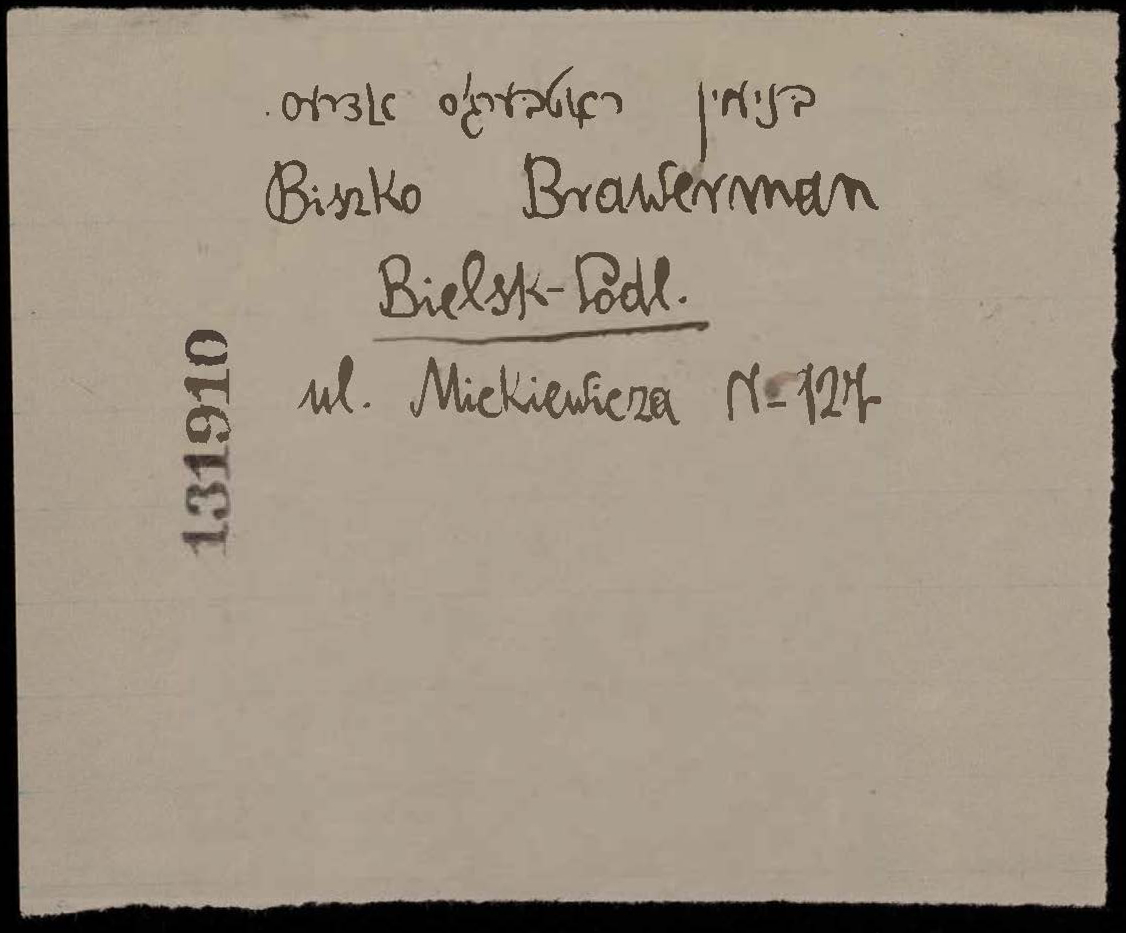
I emailed Kenneth Moss to inquire if he had identified Binyomin Rotberg as Binyamin Biszko-Brawerman. In his response, Moss copied Dr. Rona Yona and Dr. Kamil Kijek, scholars who had previously worked with him and researched this question. Kijek stated that prior research had determined with 99% probability that Binyomin Rotberg was indeed Binyamin Biszko-Brawerman, but finding this card served as conclusive proof. Both he and Yona explained that the information on the card would have been submitted by Rotberg/Brawerman himself because participants in the YIVO contest were required to provide their true identity in a sealed envelope so they could be contacted if they won a prize.
A subsequent search turned up a postcard in another file. It
was sent to YIVO in Vilnius with the same return address as
above and signed on the back in Yiddish as “Binyomin Rotberg
(B. Brawerman).”

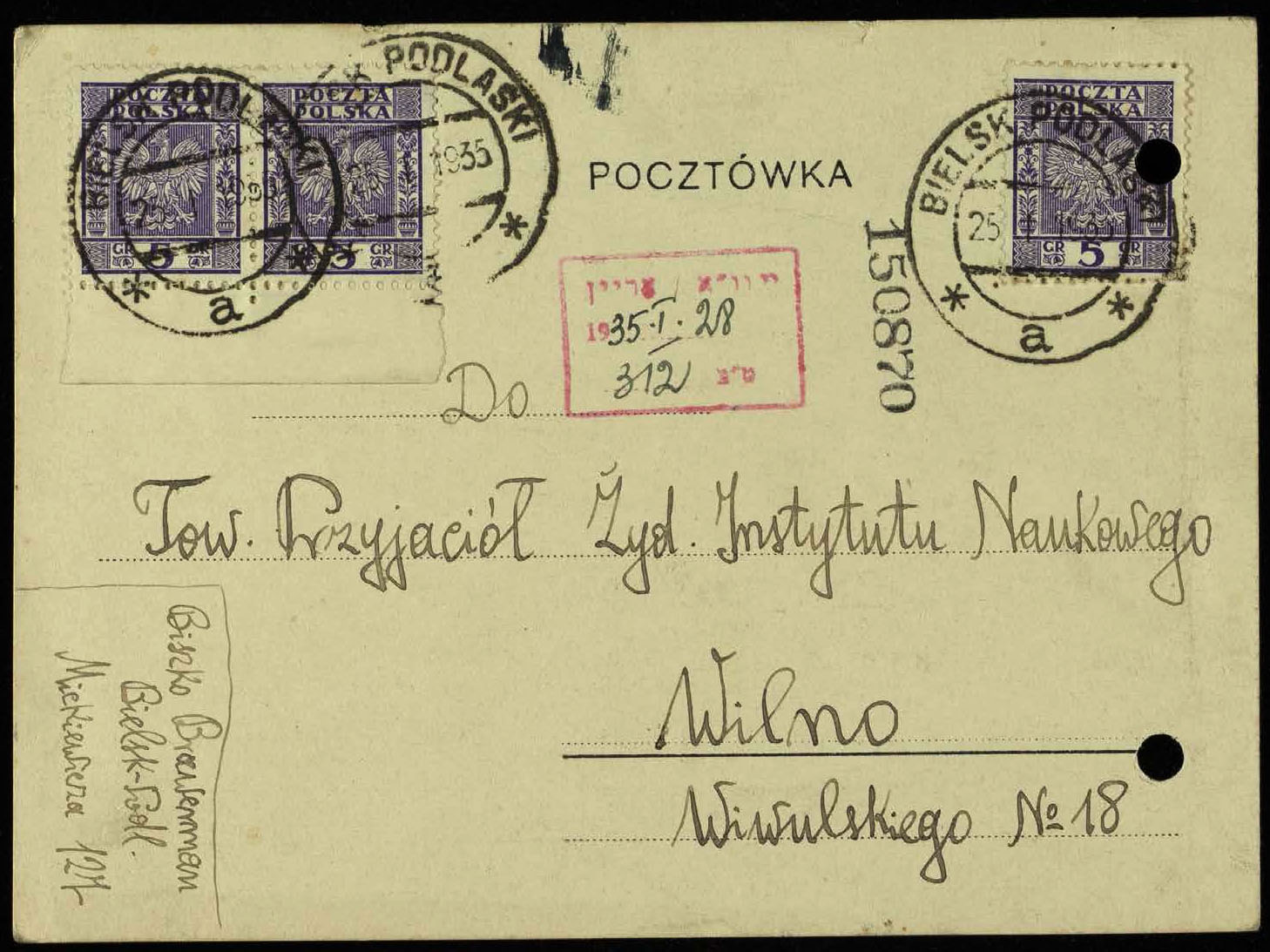
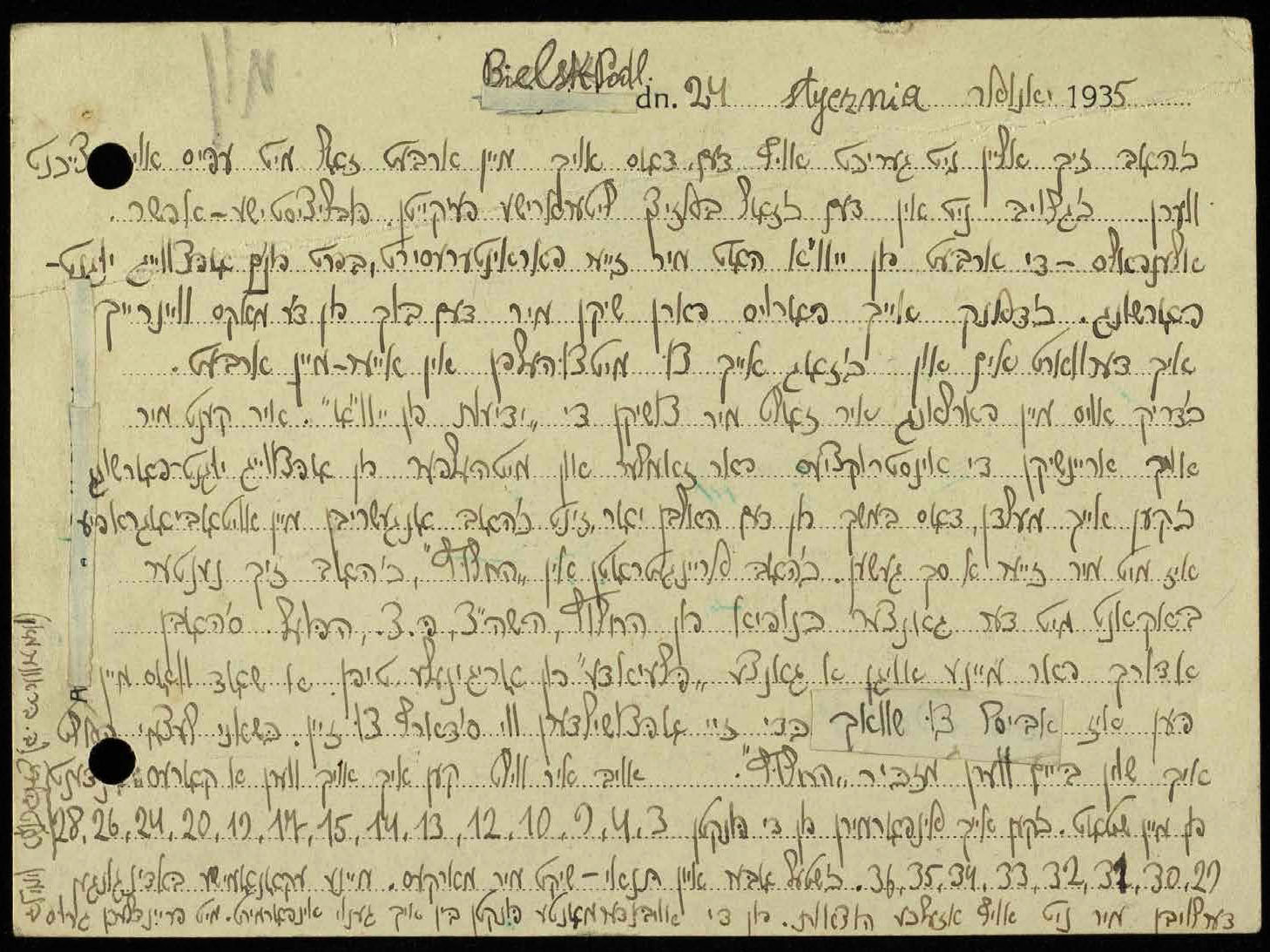
Brightness and contrast of
the images has been adjusted to improve legibility.
Click to see larger images.
In the postcard, dated January 24, 1935, Brawerman informs
YIVO that he is happy to have his autobiography recognized in
and be sent a copy of Max Weinreich’s Der veg tsu undzer
yugnt [The Road to Our Youth, 1935]. [Free copies
were distributed to the 75 autobiographers who were cited in
the book.]1 He adds that much has
happened since he wrote six months earlier. In particular, he
has joined HeHalutz2 and
familiarized himself with the full range of (left) Zionist
organizations in Bielsk. [Records indicate that Brawerman was
accepted into HeHalutz's hakhshara training program, a
preparation for making aliyah and a prerequisite for receiving
an immigration certificate to Eretz Israel in the British
Mandate.] He sympathizes
with YIVO’s work and offers to write more about the youth
scene in Bielsk for them, but asks them to send him stamps,
because his economic situation does not allow him to buy
postage. [YIVO’s Division of Youth Research encouraged their
young correspondents to stay in touch – they continued to send
autobiographies after the competition ended, as well as
collected correspondences, literary works, and essays.]3 Thanks to
Kenneth Moss for the translation.
Brawerman kept his identity a secret
by systematically changing the names of people and places in
his autobiography and his letter to Weinreich. His secret held
for nine decades and his fate remains unknown. No record of
his death or survival have been found, and the biography makes
no mention of a life after Bielsk. Yad Vashem has records of
six Brawerman family members who were Holocaust
victims.
The last paragraph of his biography states that Binyomin was
not able to leave a lasting legacy. However, the enduring
significance of his writing is evident in its continued use
and relevance nine decades later. His reflections—once
anonymous—now illuminate the fractured hopes of a generation.
His voice, preserved through archival diligence, speaks to us
still. His work, and on a larger scale An Unchosen People,
speaks not only of antisemitism but of dramatically
conflicting Jewish responses to it. They included opposing
ideas of Zionism vs. Diasporism as an answer to the question
of the Jewish future, sometimes resulting in physical violence
among Jews.
Understanding this period of time, and its similarities to the
global wave of antisemitism facing us today, might help us
make decisions and take actions necessary for a better future.
Included in the Binyomin Rotberg file on the Center for Jewish History’s website are three family photographs. Two have handwritten notes on the back. The photo without a note could be a photo of him with his mother. (Binyomin was born in 1915. His mother died in 1921.)4 One photo is identified as his mother and grandfather. Another photo is identified as his aunt from Grodno, who he mentioned many times in his autobiography and his letter to Max Weinreich.5
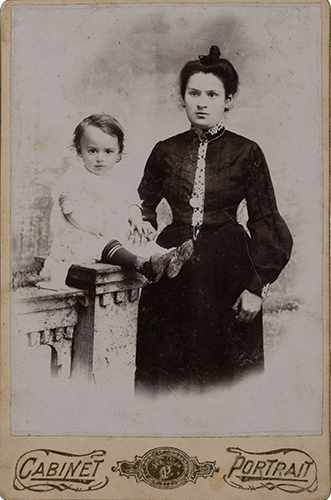
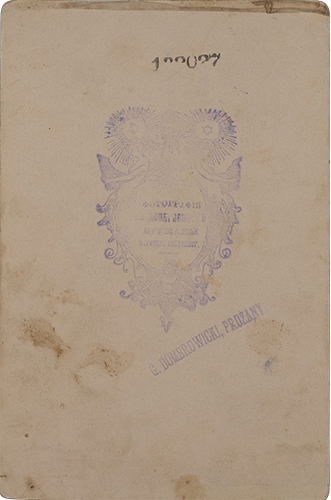
Unlabeled, this may be
Binyomin and his mother, who died in 1921.
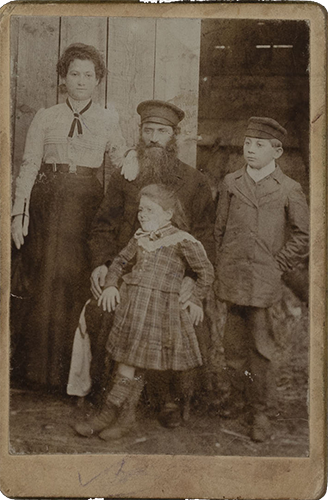
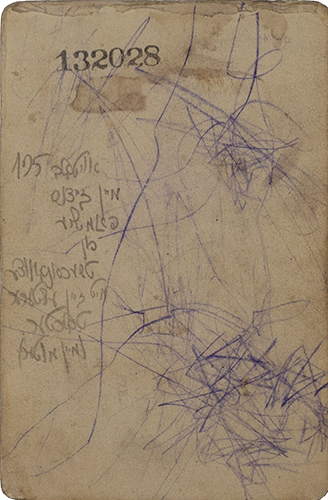
"Auto 195. My
grandfather's family from Chechanovitz [Ciechanowiec] with
his elder daughter (my mother)"6
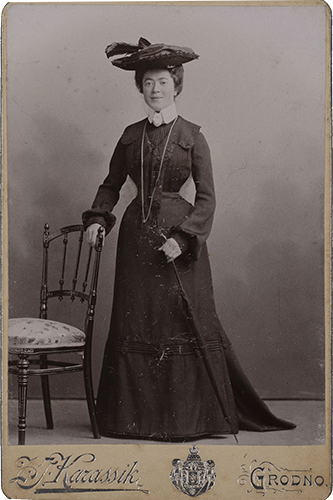
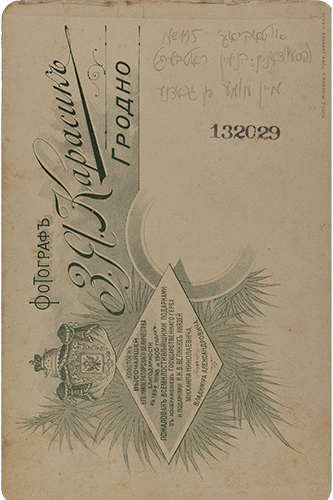
“Autobiography No.195.
(Pseudonym: Binyomin Rotberg). My aunt from Grodno.”7
[Referred to in his documents
as Chava, she was his father Meir’s sister and is a
recurring figure in his writings.
As noted above, these may not be their real names.]
Andrew
Blumberg
December 12, 2024
Sources and Citations:
1, 3: YIVO's Autobiographies
of Jewish Youth, description of
archival materials.
2: HeHalutz: literally The Pioneer. See
the chapters beginning in the Movements and Institutions in
Bielsk section of the Bielsk yizkor book, including:
- About “HeHalutz” and
Pioneering in Bielsk
- HeHalutz
Hatzair as an Active and Activating Force
- Additional
Details to “HeHalutz Hatzair”
- In
the Hakhshara - in Bielsk
4, 5: “Płonęli gniewem,”
Autobiografia młodego Żyda, ("They were burning with
anger," Autobiography of a young Jew, containing Polish
translations of Brawerman's submission to YIVO's autobiography
contest and his letter responding to Weinreich's Der
veg tsu undzer yugnt), Kamil Kijek, Jan 1, 2021,
Wydawnictwo Naukowe PWN SA.
6, 7: Translation provided by
Shimon Sporn, Holocaust Legacy and
Family Biographer.
Address card and photographs - YIVO archive at the
Center for Jewish History website. Autobiographies of
Jewish Youth, Record Group 4, Series 1, Subseries 1,
"Binyomin Rotberg," Bielsk Podlaski, Yugfor #195, Folder 3542,
Part 2, pages 79-84. https://digipres.cjh.org/delivery/DeliveryManagerServlet?dps_pid=IE6069042
Postcard (incl. signature) - YIVO archive at the Center for
Jewish History website. Autobiographies of
Jewish Youth, Record Group 4, Series 2, Incoming
Correspondence 1932-1939, pages 11 and 12. https://digipres.cjh.org/delivery/DeliveryManagerServlet?dps_pid=IE6264536
All materials presented are used in
accordance with the terms and conditions of the Center for Jewish History.
Back to the Bielsk Podlaski home page
Updated
September 1, 2025
Copyright
© 2024 Andrew Blumberg
JewishGen Home Page | KehilaLinks Directory
This site is hosted at no cost by JewishGen, Inc., the Home of Jewish Genealogy. If you have been aided in your research by this site and wish to further our mission of preserving our history for future generations, your JewishGen-erosity is greatly appreciated.